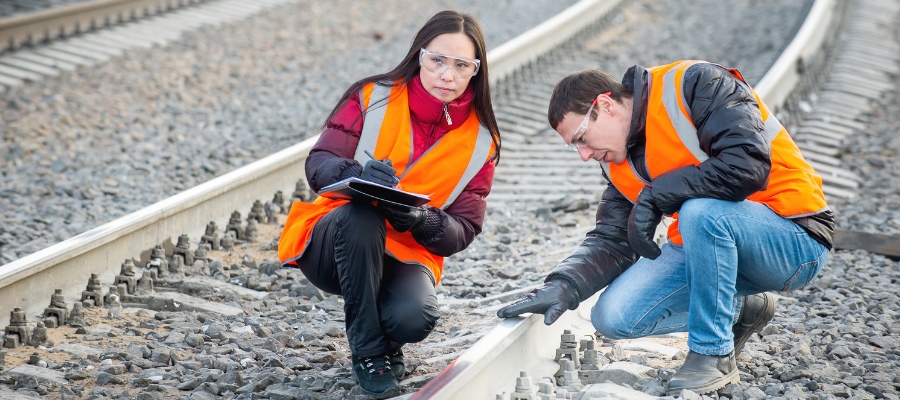🕒 Article read time: 2 minutes
Skills shortage puts rail industry plans at risk

According to industry estimates, up to 120,000 additional people will be required in the rail sector over the next five to ten years, simply to keep the railways running and deliver new projects.
On the cusp of a multi-billion pound boost to its infrastructure, the rail industry is preparing to take its place as an important driver in meeting the UK’s target of net zero emissions by 2050. The nationwide shortage of workers, however, risks derailing the sector’s ambitions.
INFRASTRUCTURE INVESTMENT
From the development of High Speed 2 (HS2) and the Northern Powerhouse Rail programme, to the East West Rail project, the rail industry is undergoing a significant infrastructure boost – many of the planned schemes are the largest seen for generations. And the employment opportunities are huge: companies behind HS2 expect this project alone to create 22,000 jobs in the next few years.
While the use of passenger services has declined since the start of the COVID-19 pandemic – in line with the government’s ‘stay at home’ safety message – rail freight has remained in high demand. Use of rail for international freight movements – particularity the Europe-China route – is also on the rise. With capacity on air and some sea freight services continuing to be strained by reduced passenger services, rail has become the transportation mode of choice for many businesses.
WHERE ARE THE WORKERS?
Although rail is a growing industry with ample and varied job opportunities, the sector is failing to attract workers. The challenges it faces are threefold: an ageing workforce, failure to attract a diverse employee base, and the withdrawal of EU workers from the UK jobs market.
Firstly, according to a recent report by City & Guilds and the National Skills Academy for Rail, just 16% of the current rail workforce is female and only 24% of women would consider a career in rail; similarly, just 27% of BAME respondents to the study said they would consider working in rail. There is also the challenge of an ageing workforce – 28% of workers in the industry are currently aged over 50 and hence could reach retirement age by 2025 – but only 26% of 18-24-year olds say they would consider a career in the industry. Coupled with the exodus of EU workers owing to Brexit – the proportion of EU workers in the rail sector dropped from 17% to 15% from 2016 to 2018 – it is clear there is an immense challenge ahead to recruit the necessary volume of candidates.
WHAT CAN BE DONE?
The industry needs to do more to raise awareness of the opportunities available and challenge the preconceptions many may have of a career in rail; this includes outreach programmes in schools, colleges, and universities.
“We also need to see the establishment of dedicated training and mentorship programmes for rail freight, something Logistics UK is committed to seeing come to fruition,” said Zoe McLernon, Multimodal Policy Manager at Logistics UK. “Apprenticeships must be fit for purpose: the number of transport apprenticeships started in the last five years is less than half the original 30,000 target set by the government in 2015, according to Logistics UK’s Skills and Employment Report 2020.”
A four-year update by the Strategic Transport Apprenticeship Taskforce (STAT) in October 2020 revealed that just 11,254 have begun training as apprentices in road and rail client bodies and the supply chain since the taskforce was established in 2016. That number is also short of a revised 15,200 target set by the Department for Transport (DfT) in 2016/17.
“With women representing just 16% of the workforce, the work of Women in Rail – an organisation dedicated to supporting women in the industry – is a vital asset in bridging the gender gap; Logistics UK continues to support its work,” McLernon continued, “Their work brings together women across rail to support and guide them through their careers while promoting opportunities in the sector. Such organisations are key to positioning rail as an attractive career choice.
“Rail freight is vital in achieving the UK’s environmental, economic, and international trading ambitions. While there are many exciting infrastructure projects underway, industry and government must work together to attract the hundreds of thousands of new applicants needed to secure the industry’s future.”
*www.logistics.org.uk/rail
Published On: 15/04/2021 17:00:11

Comments Section
If you are a Logistics UK member login to add comments.